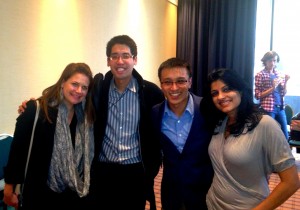International Federation of Medical Students’ Associations (IFMSA) is not just another acronym in a field laden with catchy abbreviations- it is a groundbreaking organization that despite its 60+ years of existence is doing something that remains innovative- bringing together medical student colleagues from around the world to work together as peers.
IFMSA Meets in U.S. for the First Time in Decades

Dr. Jessica Evert, CFHI Executive Director & IFMSA Alumna, with other IFMSA Alumni
This year the setting for the IFMSA General Assembly is Baltimore. Medical students from Sudan work alongside colleagues from the US, those from Panama collaborate with Poland, the interactions are endless. As an alumna of IFMSA I got the privilege to join the meeting and reconnect with old friends from my days as IFMSA-USA Vice President. IFMSA’s US affiliate is the American Medical Student Association (AMSA), who is also partnered with CFHI. IFMSA is a great resource for AMSA members, especially those interested in global health. Often the global health dialogue is dominated by Western voices. IFMSA allows 1,000+ medical students from around the world to work face-to-face twice a year. It democratizes global health and allows for crucial relationship development that is necessary for a unified global advocacy voice for health equity and justice. It has the secondary effect of humanizing perceptions of the developing world- rather that breading pity; it engenders mutual respect between colleagues from both resource-rich and resource-limited countries.
CFHI Global Health Approach Shared & Praised at IFMSA
Child Family Health International (CFHI) was in great company during the IFMSA alumni meeting. Attendees praised CFHI for its gold-standard model for global health education. Colleagues from Ghana, Serbia, Philippines, Nigeria, and beyond approached me with gratitude for CFHIs important advocacy voice in the global health education field.
I was equally as impressed by the candid discussion about advocacy provided by Predrag Stojicic from LeadingChange. Predrag distilled buzz words and espoused a platform for grassroots champion recruitment and leadership. A thoughtful organization, The 53rd Week, took the stage to describe their pragmatic approach to evaluate and maximize short-term medical trips. These trips are characterized by volunteers going to resource-limited communities, usually for 1-2 weeks to deliver medical care and related services. While well intended, the global health community is increasingly leery of short-term volunteer experiences, as their impact has been questioned and downfalls revealed.
The ‘Global Health Placebo Effect’
Lawrence Loh, co-founder of The 53rd Week, calls the appearance of impact enabled by short-term medical missions the “Global Health Placebo Effect.” Under the strong leadership of Loh and co-founder Henry Lin, The 53rd Week is creating a platform for the multiple, disjointed teams who visit a community at different times during the year to coordinate their efforts to created continuity, sustainability, and an overarching orchestrated approach targeted towards upstream interventions. Concurrently, they are raising awareness of the risks of short-term medical missions and suggesting alternatives that may lead to more tangible and sustainable ‘help.’
The efforts of these great colleagues and the synergy with CFHI philosophical approach and model of running Global Health Education Programs has been inspirational!

 of Health
of Health